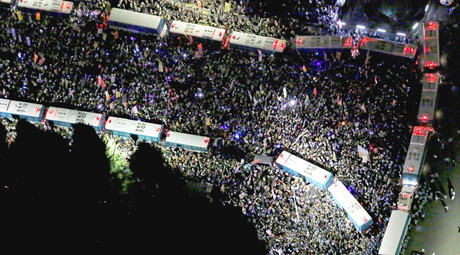Japan wants British weaponry for South China Sea standoff

Tensions in the South China Sea have led Japan to splurge on British-made hardware to prepare for a confrontation with China. Recent saber-rattling by North Korea has also given Japan cause to restock its armory.
Antagonism between China and Japan over a contested island archipelago has the Japanese Defense Ministry chasing an injection of cash to buy a range of new kit.
Reuters reported on Wednesday that, among other high-tech equipment, the Japanese are keen to purchase 11 AAV7 amphibious assault craft produced by British arms giant BAE Systems.
The move has been inspired by the ongoing confrontation between Japan and China over a set of small islands northeast of Taiwan – known in Japan as the Senkakus – over which both nations have staked a claim.
The Defense Ministry is also trying to convince the government to free up around 100 billion yen (about US$965 million) to buy a fleet of F-35 jets like those Britain is bringing into service, as well as Osprey V-22 tilt-rotor aircraft and Chinook helicopters.
Also on the agenda are new submarines and a version of the Global Hawk surveillance drone, which the British Royal Air Force (RAF) already has in service.
The ‘pivot to Asia’ – as the strategic reorganization of forces towards a rising China is known in academic circles – recently came under scrutiny when it was revealed that British troops were embedded with American units based in Okinawa.
It emerged in mid-August that British Royal Marines secretly working in Okinawa with their US counterparts may have breached a major international treaty between Japan and the US.
A freedom of information (FoI) request by the Japan Times revealed that two Royal Marines officers have been embedded with the US Marines at a base in Okinawa since January 2015.
Their presence is apparently in contravention of an international military deal that does not contain a provision for the training of third-country forces.
Writing in the Telegraph in July, King’s College London history and foreign policy professor John Bew said the UK must prepare for its future role in Asia by tying itself more closely to US global aims as the delicate Brexit negotiations are carried forward.
“In undergoing its own ‘pivot to Asia,’ the UK is likely to face dilemmas, as well as great opportunities, which require careful consideration,” he argued.
“The first question is whether Britain will want to expand the remit of its engagement with the region from trade to also encompass Asian security and political questions,” Bew wrote.
Japan’s post-World War Two pacifist foreign and defense policy was reformed in 2015 to allow intervention overseas – although the move met considerable resistance with thousands taking to the streets in protest.
The reform, personally advanced by Prime Minister Shinzo Abe, reversed Japan’s essentially non-interventionist constitution, allowing the army to intervene in conflicts outside the country’s borders, even if Japan is under no direct threat.

No comments:
Post a Comment